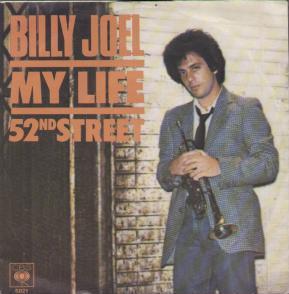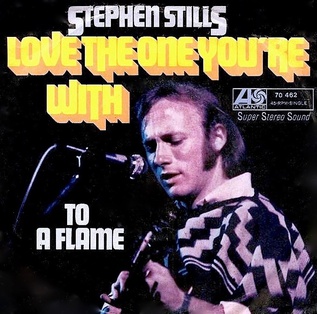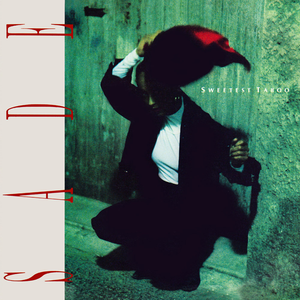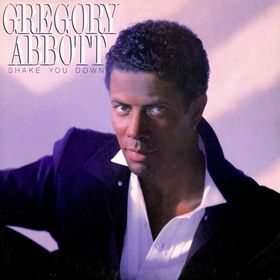
Leslie Sebastian Charles, known professionally as Billy Ocean, is a Trinidadian-born British singer and songwriter. Between 1976 and 1988, he had a series of hit songs in the UK and internationally.

"On My Own" is a duet by American singers Patti LaBelle and Michael McDonald. It was written and produced by Burt Bacharach and his then-wife Carole Bayer Sager and originally recorded by singer Dionne Warwick for inclusion on her album Friends (1985). The song was eventually recorded by LaBelle and McDonald for her eighth studio album, Winner in You (1986). It was released as the album's lead single on March 22, 1986, by MCA Records. Lyrically, "On My Own" was based on a relationship that had reached its end with both parties going their separate ways in a melancholy state with the occasional option of coming back together again one day.

"Typical Male" is a song recorded by American singer Tina Turner. It was written by Terry Britten and Graham Lyle and produced by the former for Turner's studio album Break Every Rule (1986).

"How Am I Supposed to Live Without You" is a song co-written in 1982 by Doug James and Michael Bolton. The track was originally recorded by Laura Branigan in 1983, charting at number one in both the US and Canadian Adult Contemporary charts. Bolton later recorded his own version of the song that topped the US Billboard Hot 100 and became a worldwide hit.

"Say You, Say Me" is a song written and recorded by American singer and songwriter Lionel Richie for the film White Nights. The single hit number one on the Billboard Hot 100 and on the Hot Black Singles chart in December 1985. It also became Richie's ninth number-one on the Billboard Adult Contemporary chart. The track is not available on the film's soundtrack album, as Motown did not want Richie's first single following the massive success of his 1983 album Can't Slow Down to appear on another label. It was included by Motown on Richie's 1986 release Dancing on the Ceiling.

Barbra Streisand is an American actress and singer. Her discography consists of 118 singles, 36 studio albums, 12 compilations, 11 live albums, and 15 soundtracks. According to the Recording Industry Association of America, Streisand is the second-best-selling female album artist in the United States with 68.5 million certified albums in the country, and a career total ranging from 150 to 200 million making her one of the best-selling music artists of all time.

"My Life" is a song by Billy Joel that first appeared on his 1978 album 52nd Street. A single version was released in the fall of 1978 and reached No. 2 on the U.S. adult contemporary chart. Early the next year, it peaked at No. 3 on the Billboard Hot 100.

"Caribbean Queen (No More Love on the Run)", initially released as "European Queen (No More Love on the Run)", is a 1984 song by Trinidadian-British singer Billy Ocean. Co-written and produced by Keith Diamond, it climbed to number one on both the US Billboard Hot 100 chart and the Billboard Black Singles chart, and number six on the UK Singles Chart. The song won Ocean the 1985 Grammy Award for Best Male R&B Vocal Performance, making him the first British artist to win in that category.

"Love the One You're With" is a song by American folk rock musician Stephen Stills. It was released as the lead single from his debut self-titled studio album in November 1970. The song, inspired by a remark Stills heard from musician Billy Preston, became his biggest hit single, peaking at No. 14 on the Billboard Hot 100 in early 1971.

"The Sweetest Taboo" is a song by English band Sade from their second studio album, Promise (1985). It was released in October 1985 as the album's lead single. While the song peaked at number 31 on the UK Singles Chart, it fared considerably better in the United States, where it reached number five on the Billboard Hot 100 in March 1986, remaining in the top 40 for 13 weeks. It also became the band's second consecutive number-one single on the Billboard Adult Contemporary chart, following "Smooth Operator".

"Two People" is a song by recording artist Tina Turner. It was written by Terry Britten and Graham Lyle, with production helmed by the former, and released as the second single from her sixth solo album Break Every Rule (1986).

"Shake You Down" is a song by American R&B artist, writer and producer Gregory Abbott. It was released in August 1986 as the lead single from his debut album of the same name. It became Abbott's biggest hit and was certified platinum by the RIAA. The track is also featured in the 2007 film Are We Done Yet?

"Loverboy" is Billy Ocean's second single from his 1984 album, Suddenly. It was produced by Keith Diamond and reached number 2 on the US Billboard Hot 100 as well as hitting number 20 on the soul chart, and number 15 on the UK Singles Chart in February 1985. It also reached the top spot of the Hot Dance Music/Club Play chart in the US, in an extended version. The track was released on the Jive label under the catalogue reference, JIVE 80. The song was played in the first episode of the long-running BBC One medical drama Casualty on 6 September 1986.

Billboard Hot R&B Hits: 1986 is a compilation album released by Rhino Records in 1995, featuring 10 hit rhythm and blues recordings from 1986.

"Suddenly" is a song from 1985 co-written and performed by UK-based singer Billy Ocean. Co-written and produced by Keith Diamond, it is the title track to Ocean's 1984 breakthrough album.

Love Zone is the sixth studio album by British singer Billy Ocean, released on 6 May 1986 by Jive Records. Three singles were released from the album, including Ocean's second US No. 1 single "There'll Be Sad Songs " and the US top ten entry "Love Zone". It also features the UK No. 1 and US No. 2 single "When the Going Gets Tough, the Tough Get Going", which had originally been released as a single from the soundtrack to the 1985 film The Jewel of the Nile.

"I Miss You" is a hit single recorded by American R&B and pop band Klymaxx for their fourth album, Meeting in the Ladies Room (1984). Written and co-produced by Klymaxx keyboardist Lynn Malsby, the song was released as the album's third single. "I Miss You" eventually reached number 5 on the US Billboard Hot 100 chart, number 2 on the New Zealand Singles Chart, and number 1 on the Canadian RPM Top Singles chart. Despite peaking at number 5 in the US, it was ranked at number 3 on the year-end Billboard chart for 1986, mainly because of its run on the pop chart lasting for 29 weeks.

"Love Really Hurts Without You" is a song recorded by British R&B recording artist Billy Ocean. The song – written by Ocean under his real name Leslie Charles with the track's producer Ben Findon – was the second single recorded in the name Billy Ocean and provided Ocean with his first chart record in 1976.

"When the Going Gets Tough, the Tough Get Going" is a 1985 song co-written and originally recorded by English singer Billy Ocean in 1985.

"You Won't See Me Cry" is a song by American pop music group Wilson Phillips from their second studio album, Shadows and Light (1992). The song was released on April 28, 1992, by SBK Records. It was released as the lead single from the album, reaching No. 1 in Canada and Finland, No. 18 in the United Kingdom, and No. 20 on the US Billboard Hot 100. It was the group's last top-50 hit in most countries.




















